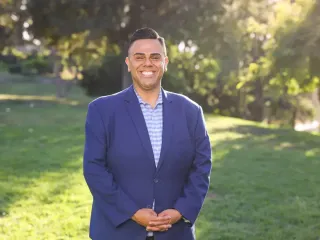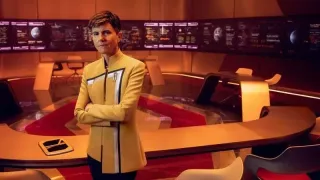
September 11, 2025
CA legislators adopt various LGBTQ bills
Matthew S. Bajko READ TIME: 5 MIN.
Legislation strengthening California’s status as a transgender refuge state and addressing suicide among LGBTQ youth are among those headed to Governor Gavin Newsom’s desk. Another bill passed out of the state Legislature addresses homelessness among LGBTQ individuals.
Newsom has until October 12 to either sign the bills into law or veto them. He has already pledged to enact Assembly Bill 727 authored by gay Assemblymember Mark González (D-Los Angeles).
It will require public schools with grades 7 to 12, plus colleges and universities, to add the Trevor Project’s 24 hours per day, 7 days per week suicide hotline to their student identification cards. González had introduced AB 727 in response to the inflated rates of suicidal ideation in LGBTQ youth.
Education officials at the campuses covered by the bill would need to update their ID cards for pupils by July 1, 2026, once AB 727 becomes law. As the bill specifies, the telephone number used by the national LGBTQ youth-focused nonprofit is 1-866-488-7386, while the text line can be accessed by texting START to 678-678.
AB 727 passed out of the Assembly on a 58-15 vote with seven abstentions September 10. The day prior, the Senate had passed it 30-10.
In the spring, Newsom had announced he would sign AB 727 into law once it hit his desk. He did so months prior to the Trump administration canceling in July the specially trained LGBTQ crisis counselors youth under the age of 25 could request when calling the national 988 Suicide and Crisis Lifeline.
Since then, California and several other states have moved to provide such specialty counselors via their state-based suicide hotlines. But as the Bay Area Reporter noted in July, officials in Sacramento and staffers at The Trevor Project, a national nonprofit focused on the needs of LGBTQ youth, have said it will take months to provide the hundreds of crisis counselors across California's 12 call centers with the extra training and skills development to support LGBTQ+ youth in crisis.
Speaking to the B.A.R. earlier this summer, González equated his legislation with providing a “beacon of hope” to LGBTQ young people who may be struggling mentally and contemplating taking their own life. It does so by making The Trevor Project’s helpline number readily available to them in such times of crisis since they just need to look at their ID card to find it.
“In California, we are going to keep that hope alive because that is what we do,” he said.
Other bills
Also providing hope amid darkening times for transgender youth and their families is the goal of Senate Bill 497 authored by gay state Senator Scott Wiener (D-San Francisco). It aims to bolster California’s status as a “transgender refuge state” first enacted two years ago by Golden State leaders in response to anti-trans laws being adopted by other states.
As such, California lawmakers made it state policy to reject any out-of-state court judgments removing trans kids from their parents' custody because they allowed them to receive gender-affirming health care. State health officials are also forbidden from complying with subpoenas seeking health records and any information related to such criminal cases, and public safety officers must make out-of-state criminal arrest warrants for such parents their lowest priority.
Now, with the Trump administration attacking the rights of trans youth and adults, California would require warrants for law enforcement requests through the state’s health care database should SB 497 become law. The bill would also establish that accessing and knowingly sharing health data from a state database without a warrant to unauthorized parties is punishable as a misdemeanor.
The bill would also expand California’s transgender shield laws to prohibit health care providers from complying with subpoenas requiring the disclosure of medical information related to gender-affirming health care. Already, several hospital systems in the state, including Stanford and Kaiser Permanente, have paused gender-affirming surgeries for trans youth under 19 in fear of being penalized by the Trump administration for providing such care.
The Senate passed SB 497 Wednesday by a 30-10 vote. The day prior the bill had passed out of the Assembly on a 61-17 vote with two abstentions.
“The Trump administration is trying to make transgender people the scapegoats for their fascist takeover, and California must stand up to protect them,” stated Wiener. “President Trump has made it clear he is willing to violate laws and norms to target transgender people, and that he will not stop until their existence has been erased from public life. California must do everything in our power to protect the transgender community, and I’m confident that the governor will continue his longstanding leadership on trans issues.”
AB 82 by gay Assemblymember Chris Ward (D-San Diego) would allow a gender-affirming health care provider, employee, or volunteer facing threats of violence or harassment from the public because of their affiliation with a gender-affirming health care services facility to seek to ensure their residential address isn’t disclosed via public records requests to state agencies.
The bill would also make it a crime to share online the images of and the personal information for such individuals, commonly known as doxing a person. And it would prevent health providers from reporting certain medications taken by trans patients to an electronic database that monitors the prescribing and dispensing of certain controlled substances.
It passed out of the Assembly Wednesday on a 61-12 vote with seven abstentions. Senators had passed it the day prior on a 29-8 vote with three abstentions.
If enacted by Newsom, then the state’s Department of Justice would have until January 1, 2027, to remove certain existing records related to the dispensing of testosterone or mifepristone to patients from the Controlled Substances Utilization Review and Evaluation System it oversees.
AB 678 by bisexual Assemblymember Alex Lee (D-San Jose) would require the state’s Interagency Council on Homelessness to coordinate with LGBTQ+ community leaders to deliver by July 1, 2027 a plan for providing inclusive and culturally competent services to LGBTQ+ people experiencing homelessness. The Senate unanimously adopted it September 10, as the Assembly had passed it back in June.
SB 590 by Senator María Elena Durazo (D-Los Angeles) would update the state’s paid family leave program so employees, beginning on July 1, 2027, can receive wage replacement benefits for up to eight weeks when taking time off to care for a seriously ill-chosen family member who is not a blood relative, child, or their significant other. Several years ago, the state had expanded certain family leave provisions to include chosen family members but it did not cover the PFL income.
The bill unanimously passed out of the Senate Wednesday. On Tuesday, the Assembly had passed it 76-0 with four abstentions.
Also on September 9, AB 908 by gay Assemblymember José Luis Solache Jr. (D-Lynwood) was held and placed on the Senate’s inactive file. It would have required that the annual Coordinated Compliance Review Manual provided to school districts by the Superintendent of Public Instruction includes a question on if they are offering LGBTQ-inclusive social science instruction as required by state law.
There remain seven other LGBTQ-related bills that the B.A.R. is tracking this year. Legislators have until Friday to send bills to the governor before the end of their current session.
If you are experiencing a crisis, call The Trevor Project at 1-866-488-7386 or visit thetrevorproject.org .






